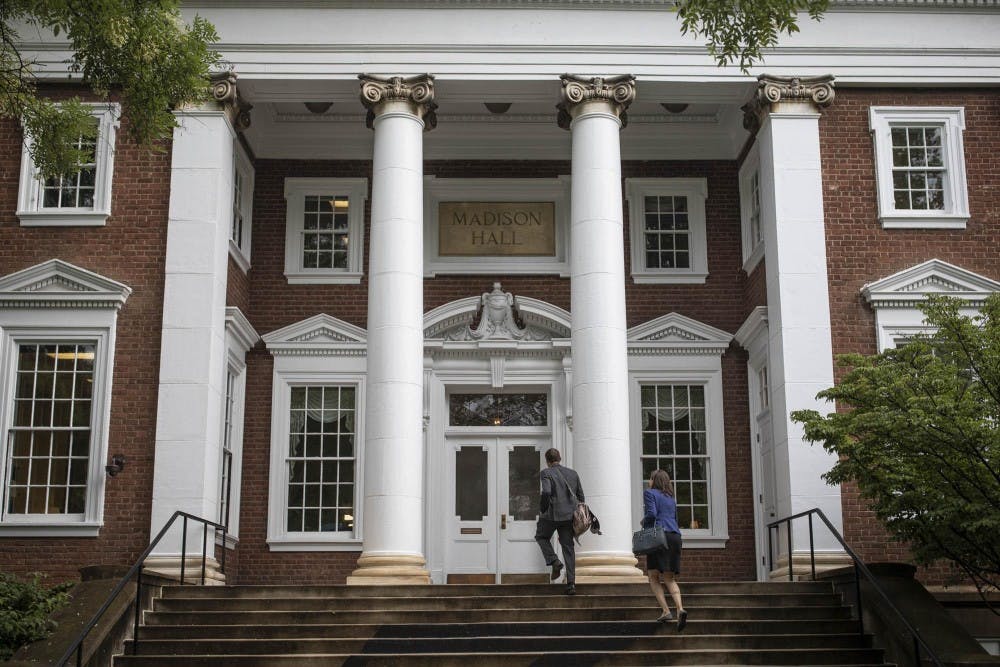University President Jim Ryan’s community working group — commissioned by Ryan in October 2018 to strengthen historically strained ties between the Charlottesville community and the University by identifying the area’s most pressing issues — released a report Friday morning naming jobs and wages as its top priority issue for the University to address in recent years.
The 16-member working group — comprised of University faculty members, Charlottesville community members and a Law student — combined research and reports, personal experience and a public engagement period to name the issues it defines as a top priority for the University to address. Following jobs and wages on the list as top priority issues were affordable workforce housing, public and equitable healthcare and youth and education. These top priority items came from what was initially a list of seven main focus areas — affordable housing, jobs and wages at the University, youth and education, law enforcement and criminal justice reform, public health care, transportation and institutional accountability at the University.
“I was not that surprised by the findings, but I think it's still important to go through the process,” Ryan said. “It's too early to say exactly what we'll do in response, but my hope is that we'll be able to tackle issues relatively quickly. Some of them are longer term and will require a longer conversation but one of the principles that was in the report that I take very seriously is the idea of institutional accountability.”
The University has increasingly come under fire in recent years for its lack of a living wage for many of its employees, and the student-led Living Wage Campaign is the longest unsuccessful living wage campaign at a collegiate institution. In Charlottesville, a living wage for a single adult is $12.03, and a living wage for a family of four is $16.84. The report says that the University should not only institute a living wage, but establish stronger connections with underprivileged Charlottesville residents to ensure upward mobility through careers at the University that pay a living wage.
“The University should provide a living wage for all its employees and contract workers, and partner with the community to foster work environments where marginalized populations (e.g., people of color, women, economically disadvantaged, etc.) can move upward and seek promotion opportunities at the University and across the region,” the report reads.
“You can get affordable housing, affordable healthcare, affordable educational access if you have a decent job that pays a decent wage,” said Ridge Schuyler, dean of community self-sufficiency programs at Piedmont Virginia Community College and member of the working group.
The report then offers Ryan three concrete “solutions in these priority areas in the near term and strengthening the University-community relationship over the long term.” These are establishing a new Vice President of Community Partnership that would oversee a new Office of Community Partnerships and Social Impact, founding an equity institute to promote accountability and “responsible community partnership” and ensuring the University invests substantially in surrounding communities to promote the reduction of inequality in wages, housing, healthcare and education.
While not included in the list of issues to prioritize, institutional accountability at the University was heavily discussed in the report, with the working group saying accountability is necessary if the identified issues are to be properly addressed.
“The promise of progress cannot be fully realized or trusted unless institutional accountability becomes the University of Virginia’s guiding light,” the report reads. “We strongly encourage the creation and cultivation of a University culture that truly values authentic partnerships, quality of care, work, and volunteerism and where institutional accountability permeates throughout.”
In order “to be a partner and anchor for social change,” the report urges the University and Ryan to tell the truth about “exclusionary practices” at the University in the past, including those “related to race, gender and disability.”
The working group relied heavily on public engagement in order to name its four top priority issues. Public response and feedback was gathered through a short survey, focus groups, one-on-one conversations between group members and their networks and through scheduled appearances at several community gathering centers including a City Council meeting, Carver Recreation Center and Mt. Zion First African Baptist Church.
The survey — which asked respondents to rank the seven focus issues from their top priority to their least important priority — posted on the working group’s website, received over 3,000 responses. These responses are representative of Charlottesville’s racial demographics — 69 percent white and 19 percent black — but overrepresented individuals from higher income brackets. The working group adjusted for the overrepresentation by weighing the results to more accurately reflect the income distribution in the Charlottesville metropolitan area.
According to the report, the working group feels confident that the results adequately reflect the variety of backgrounds and demographic groups at the University and around Charlottesville.
“We understood from the outset that we cannot possibly speak for every single community member,” the report reads. “And yet, we feel confident that our report aggregates much prior work and thousands of voices from diverse communities, represented at the University and populating the surrounding region. We strove for representation that reflects the people who most need to be heard.”
According to Ryan, the University has already begun addressing the issues and hopes to make an impact by the end of the semester.
“This is one of my highest priorities as president and we will be working on these issues right away — and we already have done in some respects,” Ryan said.
Correction: This article has been updated with Ridge Schuyler's correct position on the working group.






